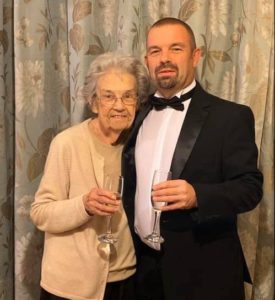It’s a long, hot summer this year, and we all want to keep cool. It’s especially important for older people. In the heat wave that swept through Europe in 2003 thousands died of heat -related illnesses. 3,000 died in Paris alone that August. Grandparents had chosen to stay behind as their families took refuge in the cooler mountain regions. Now, in the UK, there are reports of older people turning up in A& E with heat exhaustion.
My family lived in the Middle East for years, with wall-to-wall air conditioning. BUT there were also occasional ‘brown-outs’ when the electricity disappeared. Here are some of the ways we stayed cool that can help in the sizzling UK right now:
- During the cooler periods of the day, open the doors and windows to let the cool air through. BUT, when the heat rises, keep it out of the house by closing doors and windows, and closing the blinds/curtains. (There’s a reason they have working shutters on windows in hot countries!)
- Stock up with groceries if you can, and only go out to shop when the temperature is at its coolest. Then, as well as sun protective creams on face and hands, be sure to wear a floppy hat and SUN-GLASSES. It’s important to keep your head covered – and men, who often have less protective hair covering, are more likely than women to go bareheaded. Don’t do it.
- Wear light, loose clothing.
- Use fans in rooms to create air movement. But beware of trailing leads!
- Use one of the new mini-air coolers that blow air over cool water. They are very effective. Again – watch out for trailing leads.
- Put a bowl of ice cubes in front of a fan, or a couple of bottles filled with cold water – that will blow cool air into the room.
 MAKE SURE SENIORS HAVE SUFFICIENT FLUIDS! (No coffee or alcohol, and avoid high sugar fruit juices.) Older people are less sensitive to warnings of thirst. They might also avoid drinking ‘too much’ because they are not easily mobile and it’s difficult to get to the lavatory. Age UK has good information here: https://www.ageuk.org.uk/sutton/about-us/news/articles/2018/stay-hydrated-in-the-heat/
MAKE SURE SENIORS HAVE SUFFICIENT FLUIDS! (No coffee or alcohol, and avoid high sugar fruit juices.) Older people are less sensitive to warnings of thirst. They might also avoid drinking ‘too much’ because they are not easily mobile and it’s difficult to get to the lavatory. Age UK has good information here: https://www.ageuk.org.uk/sutton/about-us/news/articles/2018/stay-hydrated-in-the-heat/- Put a blouse or shirt in a plastic bag in the refrigerator, and change it now and then for the one you are wearing.
- Dab wrists, forehead, back of neck with a gel icepack, or a few cubes of ice, wrapped in a face flannel. You can also chill a face flannel in a bowl of cold water, wring it out and dab with that.
- Where you can, sit with your feet up. Many older people suffer from poor circulation, and this helps prevent fluid pooling around the ankles.
Sometimes, no matter how hard we tried, children (and some adults) developed ‘heat rash’ – small red spots, often in skin folds. It was called ‘Prickly Heat’ because it prickled – and you could get ‘Prickly Heat Powder’ to cool it down. You can still buy it here, at Tesco.
Heat exhaustion can lead to heat stroke, which is serious. Signs to watch out for are – when the person seems dizzy, weak and lacks coordination, or they are feeling sick, or have cold and clammy skin.
Also – don’t forget to look on the bright side! Talking with John and Rosie during Premier Radio’s breakfast show this morning, Rosie said some listeners had called querying whether or not it was to complain to God about the weather. John ended our thoughts on a brilliant note by reminding us that the Scriptures say we are to choose to dwell on things that are good, to deliberately focus our minds on them. Philippians 4:8 says, ‘Finally, brothers, whatever is true, whatever is honorable, whatever is just, whatever is pure, whatever is lovely, whatever is commendable, if there is any excellence, if there is anything worthy of praise, think about these things…’ (ESV)
Being sensible, we can enjoy the heatwave. We can sit in our gardens in the cool of the evening, under a tree (if we have one|); we have pure water at the turn of a tap, we have good electricity supplies to air coolers and fans, we don’t have to pile on layers of clothes, and sunshine has an uplifting effect on our mood. Just be careful of our seniors.















